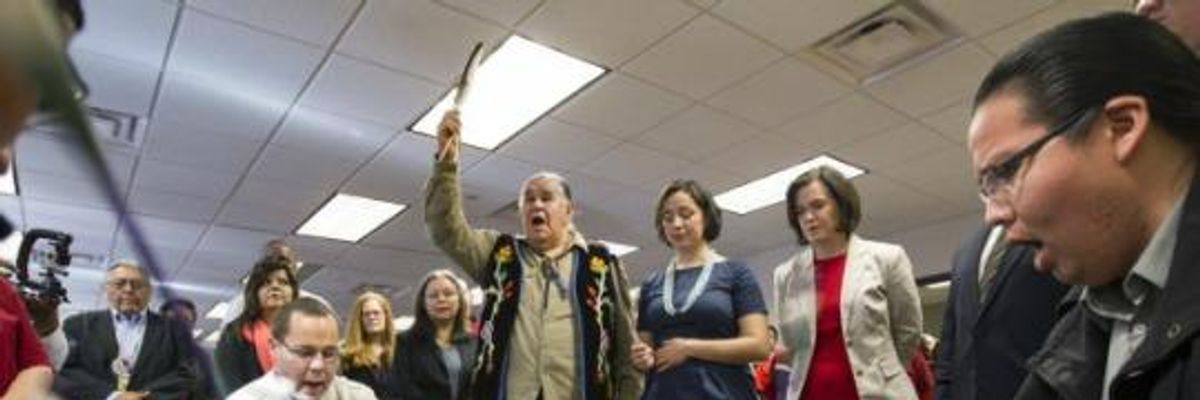
(Photo: Star Tribune)
To donate by check, phone, or other method, see our More Ways to Give page.

(Photo: Star Tribune)
The Minneapolis City Council voted Friday to recognize Columbus Day as "Indigenous Peoples Day" after years of organizing by indigenous activists.
Hundreds of Native Americans filled the Minneapolis City Hall for Friday's vote, Native News Online reports.
"City of Minneapolis recognizes the annexation of Dakota homelands for the building of our city, and knows Indigenous nations have lived upon this land since time immemorial and values the progress our society has accomplished through American Indian technology, thought, and culture," reads the resolution.
The resolution does not do away with Columbus Day, but instead adds Indigenous Peoples Day as an official holiday. However, all official city communications will say "Indigenous Peoples Day," not "Columbus Day."
Since the late 1970s, indigenous people have organized to change Columbus Day to Indigenous Peoples Day, the resolution notes.
Columbus, who never set foot in what is now the United States, is widely credited with discovering the "New World," despite the fact that indigenous people were already living there.
Columbus, who landed in what is now Haiti and the Dominican Republic, exterminated and enslaved the Taino people.
Columbus Day has been a federal holiday since 1937, but Alaska, Hawaii, Oregon, and South Dakota do not celebrate it.
Donald Trump’s attacks on democracy, justice, and a free press are escalating — putting everything we stand for at risk. We believe a better world is possible, but we can’t get there without your support. Common Dreams stands apart. We answer only to you — our readers, activists, and changemakers — not to billionaires or corporations. Our independence allows us to cover the vital stories that others won’t, spotlighting movements for peace, equality, and human rights. Right now, our work faces unprecedented challenges. Misinformation is spreading, journalists are under attack, and financial pressures are mounting. As a reader-supported, nonprofit newsroom, your support is crucial to keep this journalism alive. Whatever you can give — $10, $25, or $100 — helps us stay strong and responsive when the world needs us most. Together, we’ll continue to build the independent, courageous journalism our movement relies on. Thank you for being part of this community. |
The Minneapolis City Council voted Friday to recognize Columbus Day as "Indigenous Peoples Day" after years of organizing by indigenous activists.
Hundreds of Native Americans filled the Minneapolis City Hall for Friday's vote, Native News Online reports.
"City of Minneapolis recognizes the annexation of Dakota homelands for the building of our city, and knows Indigenous nations have lived upon this land since time immemorial and values the progress our society has accomplished through American Indian technology, thought, and culture," reads the resolution.
The resolution does not do away with Columbus Day, but instead adds Indigenous Peoples Day as an official holiday. However, all official city communications will say "Indigenous Peoples Day," not "Columbus Day."
Since the late 1970s, indigenous people have organized to change Columbus Day to Indigenous Peoples Day, the resolution notes.
Columbus, who never set foot in what is now the United States, is widely credited with discovering the "New World," despite the fact that indigenous people were already living there.
Columbus, who landed in what is now Haiti and the Dominican Republic, exterminated and enslaved the Taino people.
Columbus Day has been a federal holiday since 1937, but Alaska, Hawaii, Oregon, and South Dakota do not celebrate it.
The Minneapolis City Council voted Friday to recognize Columbus Day as "Indigenous Peoples Day" after years of organizing by indigenous activists.
Hundreds of Native Americans filled the Minneapolis City Hall for Friday's vote, Native News Online reports.
"City of Minneapolis recognizes the annexation of Dakota homelands for the building of our city, and knows Indigenous nations have lived upon this land since time immemorial and values the progress our society has accomplished through American Indian technology, thought, and culture," reads the resolution.
The resolution does not do away with Columbus Day, but instead adds Indigenous Peoples Day as an official holiday. However, all official city communications will say "Indigenous Peoples Day," not "Columbus Day."
Since the late 1970s, indigenous people have organized to change Columbus Day to Indigenous Peoples Day, the resolution notes.
Columbus, who never set foot in what is now the United States, is widely credited with discovering the "New World," despite the fact that indigenous people were already living there.
Columbus, who landed in what is now Haiti and the Dominican Republic, exterminated and enslaved the Taino people.
Columbus Day has been a federal holiday since 1937, but Alaska, Hawaii, Oregon, and South Dakota do not celebrate it.